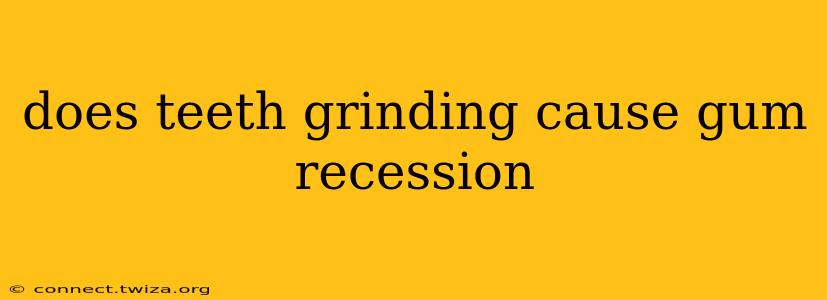Does Teeth Grinding Cause Gum Recession?
Teeth grinding, also known as bruxism, is a common condition that can have significant consequences for your oral health. While it's not a direct cause of gum recession in the same way as gum disease (periodontitis), it can certainly contribute to it and exacerbate existing problems. Let's delve into the complex relationship between teeth grinding and gum recession.
How Does Teeth Grinding Affect Gums?
Bruxism involves clenching or grinding your teeth, often unconsciously, especially during sleep. This excessive force puts immense pressure on your teeth and the surrounding tissues, including your gums. This pressure can lead to several issues that indirectly contribute to gum recession:
-
Increased Tooth Wear: Constant grinding wears down the enamel and dentin of your teeth, making them shorter and more susceptible to sensitivity. This can alter the natural alignment of your teeth, potentially putting extra strain on the supporting gum tissue.
-
Bone Loss: The excessive force from bruxism can also damage the underlying bone that supports your teeth. As bone recedes, the gums have less support, leading to gum recession.
-
Gum Inflammation: The constant pressure and friction from grinding can irritate and inflame your gums. This inflammation can weaken the gum tissue, making it more vulnerable to recession.
Can Bruxism Alone Cause Gum Recession?
While bruxism doesn't directly cause gum recession in the way periodontal disease does (through bacterial infection), it acts as an accelerant. If you already have predisposing factors like genetics, poor oral hygiene, or existing gum disease, bruxism can significantly worsen gum recession. It’s a contributing factor, not the sole culprit.
What are the Symptoms of Gum Recession?
Recognizing the signs of gum recession is crucial for early intervention. Common symptoms include:
- Longer-appearing teeth: This is the most noticeable sign, as the gums pull away from the teeth.
- Sensitive teeth: Exposed tooth roots are more sensitive to hot, cold, sweet, and acidic foods and drinks.
- Bleeding gums: While often associated with gingivitis, bleeding gums can also be a sign of gum recession.
- Loose teeth: In severe cases, bone loss can lead to loose teeth.
What are the Treatments for Bruxism and Gum Recession?
Treating both bruxism and gum recession requires a multi-pronged approach. A dentist can help determine the best course of action based on your individual circumstances. Treatment options might include:
- Mouthguards: Custom-fitted mouthguards are often recommended to protect teeth from the effects of grinding.
- Stress Management Techniques: Identifying and managing stress can reduce the frequency and severity of bruxism.
- Gum Grafting: This surgical procedure can replace lost gum tissue to cover exposed tooth roots.
- Periodontal Treatment: Addressing any underlying gum disease is vital to prevent further recession.
How Can I Prevent Gum Recession Related to Bruxism?
Prevention is key. Here’s what you can do:
- Identify and manage stress: Practice relaxation techniques such as yoga, meditation, or deep breathing exercises.
- Use a mouthguard: Even a simple over-the-counter mouthguard can offer some protection. A custom-fitted one from your dentist is ideal.
- Maintain excellent oral hygiene: Brush and floss regularly to prevent gum disease.
- Regular dental checkups: Early detection and treatment are crucial.
Can teeth grinding cause receding gums and gum disease?
Yes, teeth grinding can exacerbate existing gum disease and contribute to gum recession. The constant pressure and inflammation caused by bruxism weakens the gum tissue, making it more susceptible to damage and recession. It's crucial to address both the bruxism and any periodontal issues to prevent further problems.
In conclusion, while bruxism itself doesn't directly cause gum recession, it's a significant contributing factor that can accelerate the process, especially in individuals with pre-existing conditions or predisposing factors. Regular dental checkups, stress management, and appropriate treatment for bruxism are essential in preventing or managing gum recession. If you suspect you grind your teeth or are experiencing gum recession, consult your dentist immediately.
